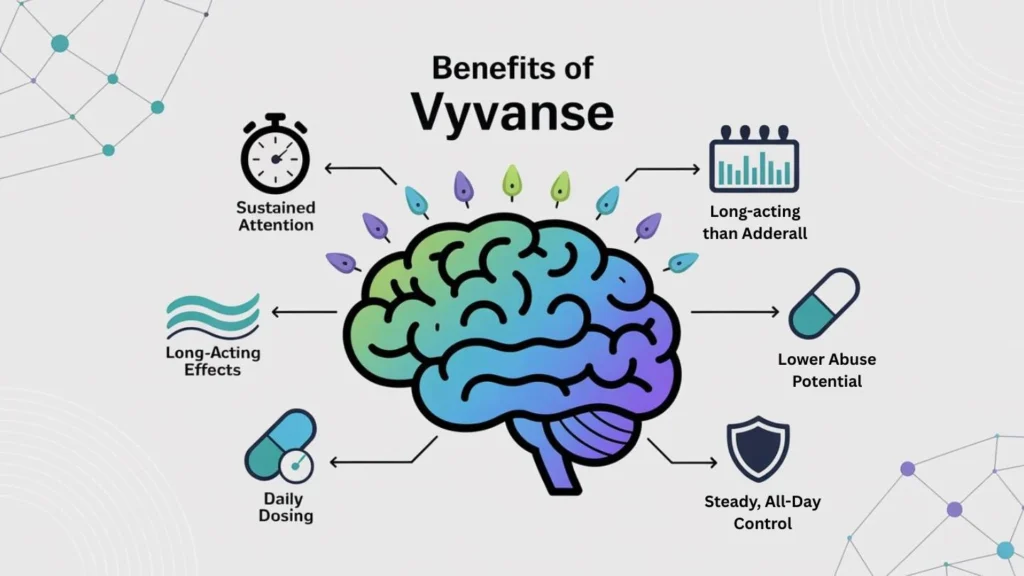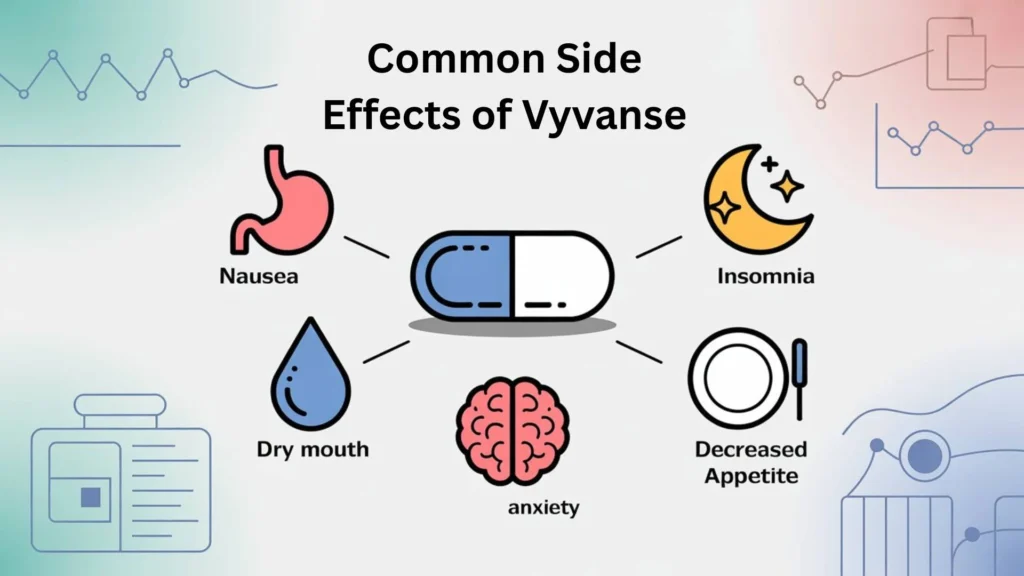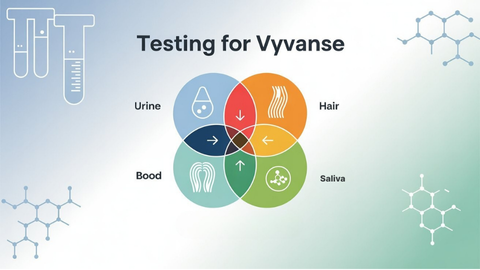Stimulant medications like Vyvanse (lisdexamfetamine) are commonly prescribed for adult ADHD. Many of Dr. Ashley Toutounchi’s patients have wondered how Vyvanse compares to other treatments and whether its benefits outweigh the potential side effects. In this article, we break down Vyvanse’s benefits, side effects, usage tips, and more – all from the perspective of an ADHD specialist. Read on to learn whether Vyvanse might be right for you and how to get the most out of your treatment.
Benefits of Vyvanse
- As mentioned earlier, individuals with ADHD taking Vyvanse can experience improved focus and attention.
- One difference between Vyvanse and Adderall is that Vyvanse is a long-acting medication. That being said, patients feel the effects for 8-10 hours when taking Vyvanse, relative to the 4-5 hours of Adderall.
- Furthermore, Vyvanse has been described as having a “smoother” side effect profile relative to other stimulants in the same class.
- Vyvanse also has the added benefit of being prescribed once per day.
- As a result, Vyvanse is considered an excellent choice for the treatment of ADHD.
- As a result, Vyvanse should be used in place of Adderall when the desired effect is to have a longer-acting drug. With roughly twice the duration of action, it should be understood that dosing frequency needs to be spread out for longer periods of time to avoid overuse.
- Vyvanse comes in two forms: a capsule and a chewable tablet. The capsule dosage ranges from 10-70mg. while the chewable tablets range from 10-60mg.

- As stated earlier, Vyvanse has less potential for abuse due to its necessity to be activated by GI enzymes to be pharmacologically active, and cannot be snorted or injected.
- Vyvanse has also been anecdotally described as having gentler side effects relative to other stimulants.
These features make Vyvanse a compelling option for many adults with ADHD. It notes that its steady, once-daily action can help maintain focus throughout the day without the peaks and crashes some patients experience on shorter-acting stimulants.
Not sure if you're taking the right amount? Learn about the signs your Vyvanse dose is too low and when to talk to your doctor.
How Vyvanse Works in the Body
- As stated earlier, Vyvanse must be cleaved by enzymes in the GI system in order to become pharmacologically active.
- That being said, it must be administered orally and swallowed with either liquid or yogurt.
- It takes around 1.5-2 hours following administration to become significantly effective.
- As a result, it should be taken in the morning.
Vyvanse is a prodrug – an inactive compound that only becomes active once your body processes it. This mechanism means Vyvanse cannot be abused by snorting or injecting (unlike some other stimulants), which is an important safety feature. Because it must travel through the digestive system to activate, users should take it in the morning with water or a light snack (e.g., yogurt). Dr. Toutounchi emphasizes that morning dosing helps align Vyvanse’s peak effect with your daytime routine.
Side Effects of Vyvanse
- Vyvanse has similar side effects to other stimulants used for the treatment of ADHD.
- These side effects include nausea, trouble sleeping, dry mouth, anxiety, and decreased or loss of appetite.
- Furthermore, one of the major side effects is insomnia.
Every medication has side effects, and Vyvanse’s are typical of stimulant therapies. Patients often report appetite loss and insomnia as the most significant effects. If you experience these or other side effects, discuss them with your doctor. In many cases, adjusting the time of dose or the dosage itself can help manage side effects without losing the medication’s benefits.
Read our in-depth blog on the Long Term Side Effects of Vyvanse to better understand

Vyvanse and Your Routine
- Because of this, Vyvanse should only be taken once per day and should not be taken in the afternoon or before bed.
- If Vyvanse is taken with food, this may delay the peak levels of the drug by an hour.
- Therefore, taking Vyvanse on an empty stomach or an hour before necessary is advised.
- However, due to the nature of Vyvanse, difficulty eating may be a result if taken before the consumption of a meal.
Curious about mixing beverages? See our full guide on Can You Drink on Vyvanse? Alcohol, Coffee & More for everything from coffee to cocktails.
Can You Take Vyvanse on an Empty Stomach?
Yes. Because Vyvanse is a prodrug activated by GI enzymes, taking it on an empty stomach (or at least an hour before eating) can speed its absorption and help you feel its full effect sooner. However, some people find that it suppresses their appetite, if you experience dizziness or nausea, try a light snack (yogurt or a banana) 30–60 minutes beforehand to balance comfort with absorption timing.
For a more detailed breakdown of absorption timing and what affects it, explore our full guide on how long does Vyvanse take to kick in on an empty stomach.
Is Vyvanse Right for You?
- Individuals with untreated or mismanaged ADHD can struggle with everyday life activities ranging from household chores to maintaining focus at work.
- Individuals who have been diagnosed with ADHD since childhood may find that their medication has become less effective over time.
- Furthermore, they may find that their medication has come with unbearable side effects including insomnia, anxiety, and loss of appetite.
- If this becomes applicable to you, you may want to ask your doctor about either adjusting or switching mediations.
- There are two main classes of stimulants for ADHD, methylphenidate-based and amphetamine-based drugs. Methylphenidate-based drugs include Concerta and Ritalin and Amphetamine based drugs include Adderall and Vyvanse.
- Studies have shown that methylphenidate is less effective in adults. Therefore, Adderall and Vyvanse would be more effective options in the treatment of ADHD.
- As stated earlier, Vyvanse has less potential for abuse due to its necessity to be activated by GI enzymes to be pharmacologically active and cannot be snorted or injected.
- Vyvanse has also been anecdotally described as having gentler side effects relative to other stimulants.
- As a reminder, it is important to tell your doctor about other medical conditions.
- Vyvanse and other stimulants are not a safe choice for those with cardiac disease.
- Furthermore, other conditions such as kidney disease or medications such as antacids may interfere with the metabolism of Vyvanse.
- Nonetheless, Vyvanse may be a great, if not the best, option for treating your ADHD.
Deciding on ADHD medication is highly individual. Dr. Toutounchi encourages patients to consider factors like age, other health conditions, and lifestyle. If you started on a methylphenidate stimulant (like Ritalin) in childhood but feel it’s less effective now, an amphetamine stimulant like Vyvanse may be worth discussing. Remember to always be transparent with your provider about medical history – for example, heart problems or interacting medications (like antacids) may rule out certain drugs. Ultimately, Vyvanse’s long duration and lower abuse potential make it an excellent choice for many adults seeking consistent symptom control.
Testing for Vyvanse
- There are a variety of tests that can be conducted to test for the presence of Vyvanse in a person’s system.
- The four major methods of testing are urine, blood, hair, and saliva.
- The most common is a urine test, as it is the most cost-effective, but not the most accurate.
- The results are immediate and can be detected for up to 5 days after the last oral use.
- Blood testing is extremely accurate, but it is more invasive and costlier than a urine test.
- Another downside with blood testing for Vyvanse is that the detectable window of time is between 3 and 6 hours, so it would have needed to be recently ingested.

- Hair testing is also expensive, but because the presence of Vyvanse use can be detected for up to three months, it is often used in the most extreme cases.
- Finally, a saliva test can be used, but it is unclear how long it can be detected in the saliva and is thus rarely used for Vyvanse.
- Since most 12-panel drug tests include the detection of amphetamines, the use of Vyvanse will signal a positive result since it is within the amphetamine class.
- However, these tests do not differentiate between racemic compounds like Dextroamphetamine and Vyvanse.
- Thus, these tests should not be used to determine the specific compound that has been ingested into a person’s body, but more so just for the detection of amphetamines in general.
If you’re asked to take a drug test, know that Vyvanse will usually trigger an amphetamine positive. Urine tests are most common (up to 5 days detection), while blood tests only catch very recent use (3–6 hours). Hair testing can find Vyvanse use for up to 3 months. Ultimately, standard drug screens cannot tell which amphetamine you took, only that an amphetamine-type stimulant is present. Dr. Toutounchi advises not to attempt “flushing” yourself too aggressively; instead, always take medications as prescribed.
Excreting Vyvanse
- Methods for excreting Vyvanse from one’s system are often sought out for toxicity purposes as well as to avoid detection during testing.
- Drinking higher volumes of water allows a person to urinate at a higher frequency and release the metabolites.
- Doing exercise can also increase the excretion through the sweat glands and allow the metabolites to be released.
- The greater amount of fiber in the diet will also promote the excretion of Vyvanse through feces.
- A combination of these techniques would further improve the speed at which Vyvanse is released from the system.
Because Vyvanse is water-soluble, staying well-hydrated can help your body process and excrete it. Some people also use exercise (to sweat out metabolites) and a high-fiber diet (to move it through the digestive tract) as additional methods to cleanse the system. These strategies may slightly speed clearance, but are never a substitute for following your prescription and medical advice.
Looking for expert guidance?
Contact us or call us today if you need help from a professional psychiatrist. We’re here to help you! Dr. Ashley Toutounchi and the Aura MD team provide personalized ADHD care through telepsychiatry, helping you find the right medication strategy to thrive in everyday life.

